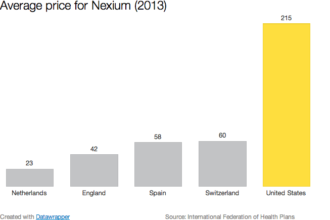As Americans we believe we have the best healthcare system in the world. But think again, it’s really not the truth. Health care delivery is dysfunctional.
We do have superb medical schools, very well trained providers, superb science and technology but the delivery of medical care is just not what it should be. We spend more for healthcare than any other country does on a per capita basis. And yet when we compare ourselves to other countries, especially developed countries, our outcomes are not better.
As Americans we believe we have the best healthcare system in the world. But think again, it’s really not the truth. Health care delivery is dysfunctional.
We do have superb medical schools, very well trained providers, superb science and technology but the delivery of medical care is just not what it should be. We spend more for healthcare than any other country does on a per capita basis. And yet when we compare ourselves to other countries, especially developed countries, our outcomes are not better.
Our life spans are somewhat shorter than countries such as Japan and our infant mortality is somewhat higher than countries like England and France. We tend to focus on disease and injury but not so much on illness prevention and health promotion. We all recognize that as a society we have some adverse lifestyle behaviors such as overeating a non-nutritious diet, being fairly sedentary, having chronic stress and having 20% of us still smoking. It’s quite clear that the best chance we have for increasing our life span and overall improving our health is to adjust our personal behaviors and to do so at an early age.
We often think of heart disease, cancer and stroke as the major causes of death and, as diseases that cause death, which is correct. But what if we go back further and look at what caused those diseases. The rank order of causes of death according to a study from the Centers for Disease Control in the Journal of the American Medical Association lists tobacco, poor nutrition, lack of exercise, alcohol to excess, infections, toxic agents, motor vehicle accidents, sexual behaviors and illicit drug use as the primary predisposing factors to the diseases that cause death. A look at that list shows that the ones at the top of the list and a number of others all relate to our behaviors.
The diseases that occur have changed substantially over the decades. At the beginning of the 1900’s it was infectious diseases that caused most deaths. Over time they came under reasonably good control with preventive techniques such as immunizations, sanitary sewer systems and clean water systems and then, of course, antibiotics. Meanwhile chronic illnesses such as coronary artery disease became much more prevalent. Even though fewer people smoke than a few decades ago our obesity and our lack of exercise have led to rapid increases in diabetes, heart disease, stroke, high blood pressure and many other chronic illnesses that last a lifetime. Insurers note that it is these diseases that account for about 70-85% of claims paid.
Our medical care system does not deal with health; it really concentrates on illnesses or trauma. It is a “sick-care” delivery system. In addition more and more illnesses today are chronic and complex, lasting a patient’s lifetime and bearing very high costs. The best way to care for these chronic illnesses is with a multi-disciplinary team approach. This is just not the typical way our medical care delivery system is organized. We tend to have a system that relies on a single provider treating an illness – the internist gives an antibiotic for pneumonia and the surgeon cuts out the diseased gall bladder. But patients with chronic illnesses really need multiple providers. For example, the diabetic may need in addition to a primary care physician, an endocrinologist, an exercise physiologist, a nutritionist, an ophthalmologist, a vascular surgeon, a nephrologist, etc. But to work well, this team needs a coordinator or quarterback and this is preferably the primary care physician. Good care coordination can direct the patient to the care he or she needs while reducing the number of specialist visits, procedures, tests and imaging — with the result that the quality of care goes up and the cost of care goes down substantially. Unfortunately, PCPs who are mostly working in a non-sustainable business model have all too little time to give this needed care coordination; that is a topic for a later post.
So we have a medical care system not a healthcare system. What we need in America today is a focus on health care meaning a greater focus on disease prevention and health promotion beginning in childhood and a recognition that chronic illnesses are the ones that not only last a lifetime but are also the diseases that are driving the high cost of care. These costs can be brought down and can be brought down quite substantially through a better approach to patient care, one that coordinates the care intensively while using a multidisciplinary team approach.
America needs to shift from a medical care to a health care system that focuses on health and wellness and for those with chronic illnesses cares for them with a well-coordinated multi-disciplinary team. The result would be greater satisfaction for patients and providers alike, higher quality and lower costs.






